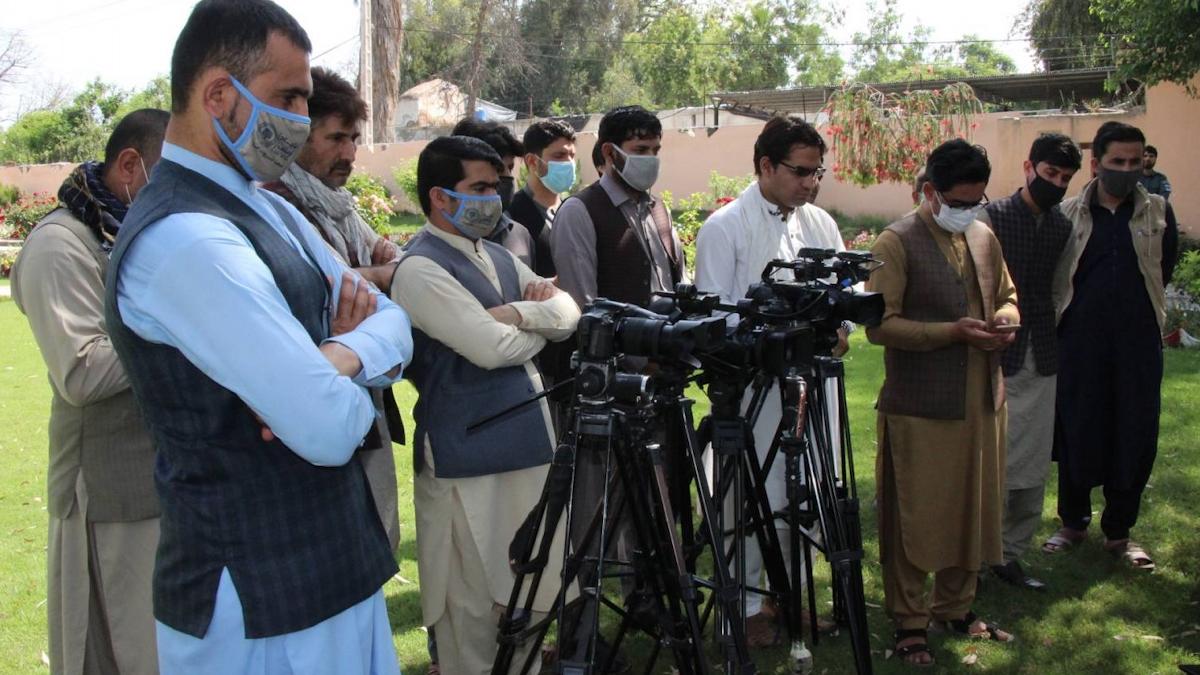KABUL - Access to accurate information helps reduce anxiety and serves to empower Afghanistan’s communities in the fight against COVID-19, said participants in a recent series of UNAMA-backed radio programmes broadcast across the country.
In the pre-recorded interactive shows, which have so far aired in six provinces, health experts and radio hosts answered questions posed by local residents and discussed the importance of media conveying facts to communities that cannot otherwise access reliable information about the health crisis.
“The COVID-19 pandemic has a major impact on mental health, causing depression, anxiety and panic,” said Dr. Jamal Alavi, the head of COVID-19 provincial taskforce in Bamyan, in one of the programmes broadcast in the central highlands province. “Access to reliable information is crucial in helping to ease tension and reduce mental disorders in Afghanistan’s communities.”
During the programmes, hosts and their guests talked about the impact of social distancing and long periods of isolation caused by COVID-19, and discussed the importance of fostering a collective sense of responsibility in getting through the health crisis, including by sharing reliable information.
“Since the beginning of this period, we have been running campaigns to inform our listeners, mainly women, about the dangerous consequences of COVID-19 and the ways to protect families from it,” said Shahla Shaiq, the head of Nargis radio in Jalalabad. “Women journalists have played a good role in helping to solve women’s problems in this period.”
The discussions also focused on Afghanistan’s Access to Information law and the importance of government institutions providing reporters with timely and credible information.
“We have very good Access to Information law, which is better than the laws of other countries in the region,” said Numan Dost, a Jalalabad-based journalist and the eastern regional head of Nai, a media advocacy group. “Sometimes the government directly disseminates information, but at times when the government chooses not to share information with the media, reporters need to seek it proactively.”
Rahmatullah Shariaty, a civil rights activist in Daikundi, expressed similar views during a broadcast in the province, and stressed the importance of reliable media. “The media’s role in providing correct information is more crucial now than ever,” he said. “Access to timely, accurate information empowers communities to fight the pandemic and its socio-economic impact on society.”
In a statement earlier this month on World Press Freedom Day, Deborah Lyons, the Secretary-General’s Special Representative for Afghanistan, said that as COVID-19 threatens life in Afghanistan and around the world, the importance of the media providing accurate and fact-based information cannot be overstated. “I salute the journalists who are fact-checking misleading stories, as the infection of misinformation puts lives at risk,” she said.
The UNAMA-backed radio programmes, which have aired in Bamyan, Daikundi, Nangarhar, Kunar, Laghman and Nuristan, are part of a series of broadcasts aimed at promoting social cohesion and a collective sense of responsibility in protecting human rights and equal access to services for all during the COVID-19 crisis.
The radio programmes on access to reliable information reached approximately 900,000 listeners. The discussions extended to social media as well, with partner radio stations encouraging their listeners to participate in the conversations and talk about matters important to their families and communities in the context of the COVID-19 pandemic.
UNAMA works with various institutions and individuals, including community leaders, youth groups, women and local media stations to create platforms – using radio, social media and television – for Afghans to engage in dialogue on pressing issues affecting their communities.
In accordance with its mandate as a political mission, UNAMA supports the Afghan people and government to achieve peace and stability. UNAMA backs conflict prevention and resolution, promoting inclusion and social cohesion, as well as strengthening regional cooperation. The Mission supports effective governance, promoting national ownership and accountable institutions that are built on respect for human rights.






